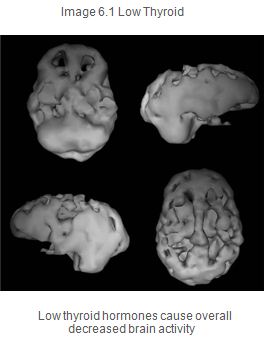THE HORMONE SOLUTION
BALANCE YOUR HORMONES TO TURN BACK THE CLOCK
Chapter 7, excerpt from New York Times Best-Seller “Change Your Brain, Change Your Body” by Daniel G. Amen, M.D.
Your hormones play a critical role in the way you act and the way you think, act, and look.
Did you know that your hormones have a huge impact on brain function, for both men and women? When your hormones are balanced you tend to feel happy and energetic. When your hormones are off, everything and everyone in your life suffers. For example, did you know that low thyroid hormone is associated with overall decreased brain activity, which makes you feel depressed, irritable, and have significant trouble thinking (Image 6.1).

Likewise, low testosterone levels have been associated with low libido, depression, memory problems, and have been implicated in Alzheimer’s disease. We are only beginning to talk about male menopause, but it is a real issue that needs to be treated for many men. Low testosterone levels may be a significant cause of mid-life crises and divorce. As his testosterone levels go down, he feels more negative, blames his wife, who is having her own hormonal issues, and looks outside of the marriage to feel young again. Of course, the new love usually doesn’t make him happy.
Low testosterone levels also affect women. I once had a female physician come up to me at a lecture and tell me that at age fifty-one she had no interest in sex, her marriage was in trouble and her mother had just died from Alzheimer’s disease. She had NO idea that low testosterone levels could be part of her problem. Later she emailed me that her testosterone levels were near zero and that taking testosterone made a huge difference for her sexuality, her memory, and her marriage.
When testosterone levels are too high, for men or for women, they can be “too competitive,” have commitment issues, be hypersexual, and struggle with acne or being too aggressive. A common condition in women associated with too much testosterone is called polycystic ovarian syndrome or PCOS. More on this in a bit.
Do you believe in PMS? I have five sisters and three daughters. I believe in PMS! But it wasn’t until I met Becky that I finally had evidence that PMS was, in fact, a brain disorder. Becky came to my office after a brief stay in jail. In the week before her period she often became moody, anxious, aggressive, and tended to drink too much. Shortly before she saw me, during the worst time of her cycle she got into a fight with her husband, attacked him with a knife and was arrested. When I met her, I decided to scan her during the worst time of her cycle, and then again two weeks later during the best time. Becky’s scans were radically different. During the difficult time of her cycle, her worry center was overactive, indicated by the arrow on Image 6.2 and her judgment center was low in activity, which may have been why she grabbed the knife. You can see the holes in the front of her brain. During the best time of her cycle her brain looked much better (image 6.3). Seeing her scans was so instructive and on treatment she did much better. Hormone fluctuations can change your brain and literally rip your family apart.